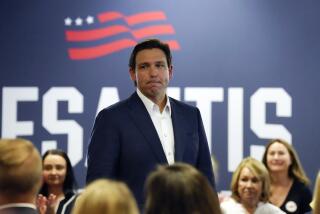THE CHARACTER CURRICULUM
- Share via
Longtime educator Gene Bedley looked at how kids were treating one another, and he didn’t like what he saw. Insults, disrespect and such a desire to be cool “that they don’t do their studies because it’s uncool.”
And though many people believe developing better attitudes is the job of parents, Bedley says schools should shoulder the responsibility of teaching their students about respect for other people and themselves.
So five years ago, when he retired as a principal, Bedley dug into his own savings to create the Character Education Center in Rancho Santa Margarita, based in his home. He and the 20 speakers who work with him try to revitalize the timeworn lessons of respect that parents have been teaching their children for generations.
Bedley contracts with schools throughout Orange County and the nation to deliver lectures, seminars and activities that aim to instill respect and understanding. One exercise has two students sit across from each other looking at the same folded piece of paper. There is a white circle on one side and a black circle on the other side. Bedley asks each student what he or she sees. After asking them to exchange seats, Bedley asks them again what they see, and each student produces a different answer from the one before.
Not a big deal; just a small illustration of how another person’s viewpoint might differ from yours, and how yours might change when you’re in the other’s position.
“It isn’t a dramatic realization or epiphany,” said Andrew Cipolla, the center’s teen respect seminar coordinator. “You’re not going to make a gangster cry. That sounds good for a movie, but in real life, it’s a process of easing into understanding. When they walk away, they may not understand completely, but it’s a nice start. We give them things to think about.”
Even a quarter of a century ago, Bedley, then principal at El Camino Real Elementary School in Irvine, was seeing signs of disrespect, division and apathy among his students. He saw them breaking agreements with one another and “having convenient relationships rather than commitment.”
So Bedley created a character education curriculum for his school, teaching the youngsters the meaning of respect and its application--divided into themes of listening, relationships and working together.
In recent years, Bedley’s teachings have been picked up by a variety of schools. He will provide his services for fees up to thousands of dollars, depending on the situation and how much the customer can afford.
*
Bedley is developing a character curriculum with legislators in Iowa. Jim Hawkins, state director for the Professional Educators of Iowa, says Bedley’s ideas are essential in an age of misguided ideas about values and respect.
“Our students today are in a quandary,” Hawkins said. “They’re not sure what moral and ethical standards are, and it shouldn’t be what’s in the media. What’s funny today is put-down humor or sexual innuendoes. We spend millions in sex education, but it’s more important to infuse character education.”
At Richland Continuation High School in Orange, Principal Brent Bailey introduced Bedley’s character education program after seeing its effect at Orange High School.
Bailey has seen the lessons produce good deeds. At Orange High, students raised $23,000 for the Leukemia Foundation, putting them in first place as the nation’s highest fund-raisers last year. Bailey sees this as an outcome of the training in character.
“They really got into this thing, and they’re not a rich school. They’re working-class,” Bailey said. “The fact is, the attitude of these kids have changed.”
Bailey saw it again at Richland after introducing the same teachings.
“Bad language was really a problem” at Richland, Bailey said. “I couldn’t sit in my office and not hear the F-word several times, and now it really is very different. I won’t attribute this to a poster on a wall, but we’ve made a determination to ask them to quit.”
Cipolla attributed the new sense of respect to the students’ understanding of what people have struggled with in their lives. Cipolla knows firsthand from being one of Bedley’s former students at El Camino Real and battling leukemia in childhood and adolescence.
“In my experience, people who weren’t nice to me were nice to me when they found out,” Cipolla said. “When people are treating each other so disrespectfully, they’re not realizing what the other person has gone through in their life. When we have a seminar, the students are affected because it made them realize what it was like to be another person.”
*
With many varying economic and family situations today, asking students to identify with their peers seems more challenging than ever.
“I had those values instilled in me from my childhood,” said Paul Klempner, principal of Isojiro Oka Elementary School in Huntington Beach. “Now, kids have video games, movies--they’re not quite the same. Families may sit down and enjoy a meal together once a year. There are single parents who work in the evening. Parents may not be able to instill in their children [the values] that were instilled when we were growing up.”
At Oka school, Klempner has used Bedley’s program for eight years in hopes of “overcoming these stumbling blocks.” In fact, Klempner recalled that teachers and parents did feel something was missing for their students and children eight years ago--until they visited El Camino Real and witnessed the effect of Bedley’s program in full.
Today, students at Oka learn about respect through example, class discussion and talks by Klempner. Teachers, in recognizing respectful students, nominate such model citizens for their names to be called out with the morning bulletin and written on a cloud for posting on a bulletin board in the hall.
What may seem childish now will serve the students into adulthood, Klempner said.
“We expose kids to the idea of compassion and cooperation, being a person of integrity, perseverance, so they’re not only better students as children but better adults and employees,” Klempner said. “What companies aren’t going to look for those traits?”
*
The Character Education Center’s Web address is https://www.ethicsusa.com.
More to Read
Sign up for Essential California
The most important California stories and recommendations in your inbox every morning.
You may occasionally receive promotional content from the Los Angeles Times.













